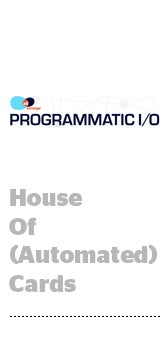 Self-serve programmatic media buying is gaining favor with the in-house marketing set.
Self-serve programmatic media buying is gaining favor with the in-house marketing set.
That was a key trend that emerged at AdExchanger’s Programmatic I/O conference in San Francisco Monday, where approximately 500 marketers and data-driven tech companies convened to share how programmatic media buying is changing advertising.
At the outset of the show, AdExchanger Director of Research Joanna O’Connell shared results from AdExchanger’s Q1 State of Programmatic Media Online Survey, which consisted of responses from 44 large-scale marketers in addition to agencies, publishers and vendors; one such data point hinted at the rise of the in-house programmatic marketer who is strongly in favor of working directly with a single platform.
Specifically, more than 40% of the marketer respondents used one general DSP such as MediaMath, DataXu or [x+1] to manage programmatic media across all channels as opposed to tapping multiple DSPs or vertical data management platforms (DMPs).
It’s one thing for marketers to want more conversions, said Konrad Feldman, cofounder and CEO of audience measurement and real-time data processing platform Quantcast. However, “it’s another thing altogether to say we want a different ‘type’ of conversion. Marketers have that data.”
Google’s Neal Mohan, VP of display advertising, echoed O’Connell’s findings. He noted onstage a “transformational convergence between programmatic and brand advertisers” beyond direct response, and said that this will be the year when half of the AdAge 100 companies will have programmatic specialist teams in residency.
Feldman added marketers are in the best position to connect media expenditures with performance. “I think [advertisers] who took a majority of search in-house [such as ecommerce companies] got to a point of advanced spend,” he said. “They wanted to connect that spend at a more granular level and certainly we’ve got quite a bit of that happening now.”
Further underpinning these observations is a finding from Casale Media that zeroes in on a tripling of marketer control on programmatic media buying. Ownership of programmatic is defined as either a marketer, managed service or network, agency, trading desk, or publisher audience extension that has the ability to conduct a scaled buy on their own terms and with their own data, according to Andrew Casale, VP of strategy for Casale Media.
The exact numbers, based on buyer-level data and Casale’s following analysis of the “top” 200 seats across all DSPs, indicate that programmatic spend coming from those owned directly by the brand marketer jumped from 3% in 2012 to 11% in 2013. Casale said a lot of new seats lit up in Q1 additionally that weren’t agencies or weren’t networks, but brand marketers.
“The premise of programmatic is taking control of your media dollars,” he told AdExchanger. “That means using these dashboards and data sets under your control. For a while, marketers were maybe listening with one ear, but they realized they can use these tools and do this themselves. We’ve never been this close to the marketer spending a dollar. There’s always been an intermediary in between.”
But that’s not to say there won’t be challenges and that brand marketers are completely taking control over their programmatic strategies.
Casale acknowledged there may be a point where bringing programmatic talent in house won’t make sense from the marketer vantage point. This, he said, is an opportunity for tech vendors to step in.
In addition to figuring out the salient data points that directly result in how media spend impact real business goals, the programmatic in-house operation will fail if there isn’t the proper balance of tech know-how and business acumen, said Michael Zeman, director of North American digital marketing for Netflix at the conference.
Still, brands dissatisfied with their agency relationships in terms of transparency, and determining which data sets are important might be tempted to push forward despite these risks. Such was the case with the ecommerce flower site 1-800-Flowers, which went self-serve.
“Probably four or five years ago, our display advertising was limited to portal buys and big network buys, which got less and less effective from a click-view determination,” said company president Chris McCann. “We spent four to six months in a managed service environment and over time took that responsibility on ourselves with our ad server and DSP. We now have a team of five people internally who deal with it and keep senior marketing involved. But…it’s hard to keep pace. The space is always moving.”











